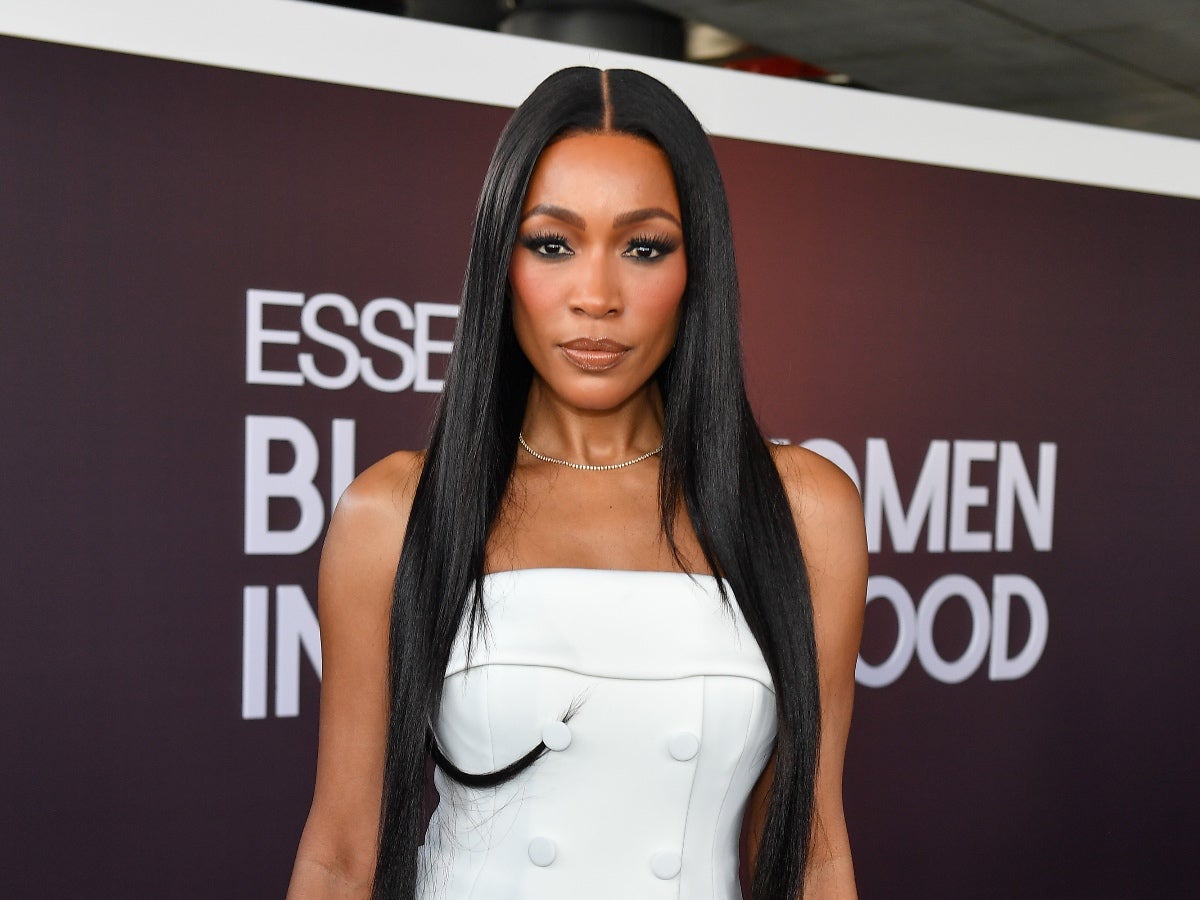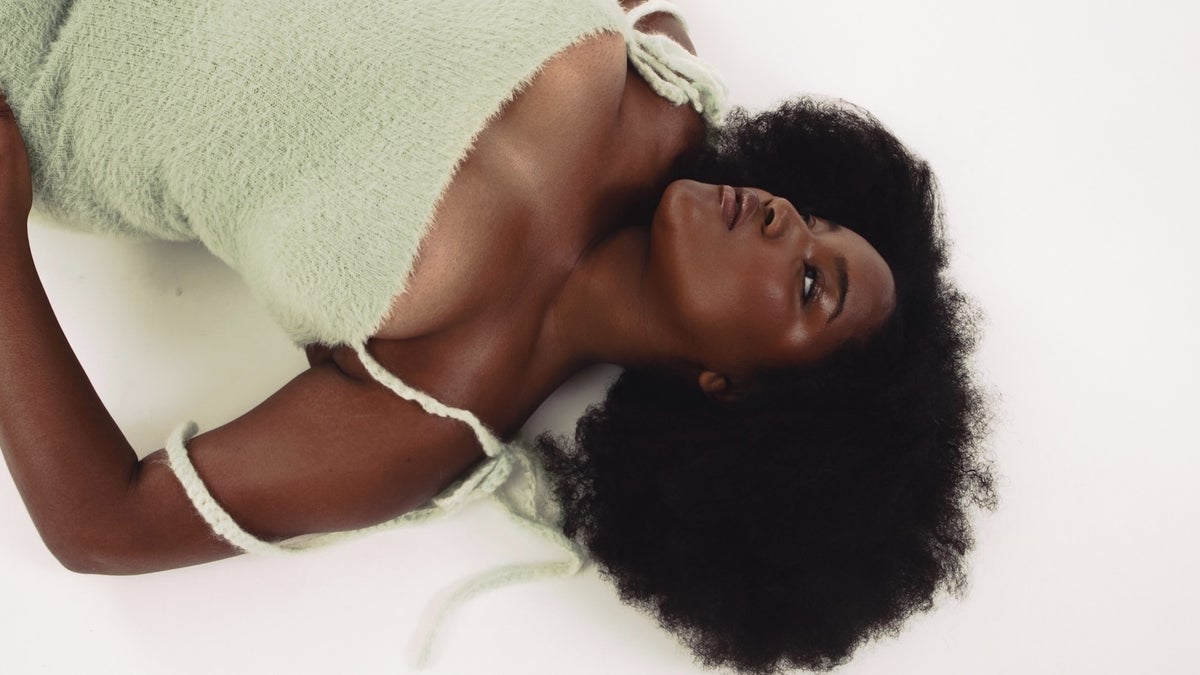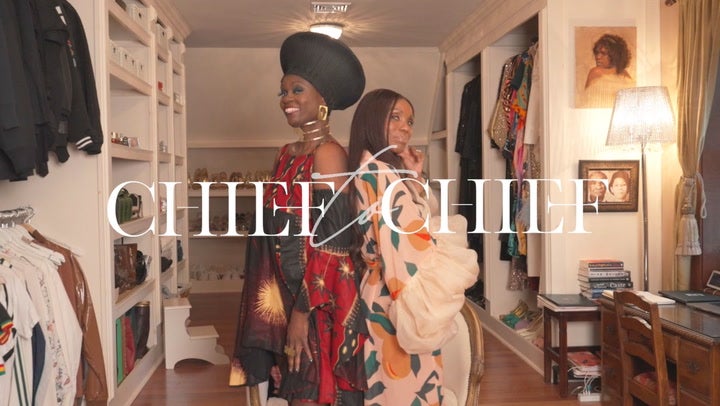
Cari Champion is breaking stereotypes by example, as well as through her work. As a native of Los Angeles, her childhood experiences molded her perspective of the world. “When I was a kid, I was always really curious about anything and everyone around me,” she says. “I think one of the most important things about being a journalist is to be curious, but my curiosity was really about what was happening in our culture, and what was happening in my neighborhood.” Disheartened by the way Black people were being portrayed on television, she decided to pursue a career where she would reshape false narratives that were attached to her community, and in turn become one of the most important individuals in news and entertainment.
After graduating from UCLA, Champion worked at several TV stations before moving to West Virginia for her first reporting job. Following her duties in cities such as Santa Ana, West Palm Beach, and Atlanta, she landed a position at the Starz network, which led to her joining ESPN as the new host of the groundbreaking debate show First Take in 2012. Two years later, Cari made her journalistic debut for the network in a segment on E:60 and the rest—as the old adage goes—was history.
In 2020, the former SportsCenter anchor left ESPN; it was then that her career truly blossomed. She was able to helm a self-titled series on Prime Video, deliver unapologetic takes on CNN, as well as show the power of authenticity on her acclaimed podcast, Naked with Cari Champion. With a list of accomplishments that rival even the most seasoned in her field, this lifelong Laker enthusiast’s greatest impact lies in the non profit foundation, Brown Girls Dream. The organization serves as an informal support system for young women of color in the early stages of their respective professions.
“If I don’t hold the door open for the next Black or Brown girl behind me, why am I doing this?” Champion says. “I feel like that is the best thing that anyone can do.” By empowering future generations, Cari has been able to increase her influence in the media space, and leave a legacy greater than she could ever imagine.
ESSENCE: I wanted to talk to you about your career, and what was it about the field of journalism that was so intriguing to you that you wanted to pursue it as your life’s work?
Cari Champion: It’s interesting, and it sounds cliché, but I knew since I was a kid I was born to do something. I grew up in LA, and it was around a time in the ’80s and ’90s where gangs were really prevalent, and I would only see—they don’t do it anymore—but I would watch the local news and they would point things out like, “We’re looking for a five-foot-10 Black man with broad shoulders and short hair.”
It was a really random description of every Black man in the neighborhood. What I thought as a kid, but I couldn’t really articulate it this way, I was just like, “That’s everybody. That doesn’t make sense. That’s all of us.” I remember telling my mom, “I don’t like the way they make minorities look on TV, more specifically Black people, Black men.” She just always kept that in the back of her pocket, and then one day we had this opportunity to do something in our neighborhood and a news camera showed up, and I immediately connected with the idea of media as powerful, arguably the most powerful medium if it’s used correctly, or incorrectly, as we can see now.
Ever since then, that’s what I wanted to do. But it would solidify when I saw that woman Oprah on TV, I was like, “She looks like everybody in my family, I’m very familiar with her. I’m captivated by what she looks like and what she’s doing, and I’m going to do it.” So I just started off there, I was just curious. I didn’t like the way that my people were being portrayed on TV to me on local news, and then there was this woman who looked like me and she seemed to be captivating and doing something powerful and good, at least in my mind, my young mind at the time, and I never looked back.
What I ended up doing was local news, and then I moved from local news to sports, and then from sports I went to national sports, and then from that I moved back into the world of news. But on a trajectory that covered the intersection of sports and politics, sports and culture, sports and our people. That’s a new world for many people, because they think the two don’t intersect, but they really truly do.
Why do you think the realm of sports remains so popular and captivating within Black culture?
Because the four popular sports—basketball, football, baseball, and you can put whatever the fourth one is for yourself. It could be WWE, NASCAR, maybe you like MMA or tennis. You can insert soccer. That fourth sport can be whatever you want it to be, NASCAR. But the mains, we see ourselves. That is, for so long, that as entertainment was our way out of a hopeless life. That was our key out of the ‘hood, that was our way to express ourselves freely, and also be accepted.
I think it’s popular because anybody—Black, white, purple and green—sports unifies. I grew up in LA, I’m a die hard Lakers fan, and I remember going to these Lakers parades when the Lakers were really dominating and winning, and you look around and you just see everybody that looks like you, but they don’t look like you. Black, white, Latin, green, but we are very, very connected by this particular sport that bonds us, this thing that we love. For us specifically, we’re looking at this player as our hero, as somebody who is giving us the right to brag, it’s our own.
Black people have a very unique relationship with other Blacks who are in the limelight. Not even in the limelight, we take ownership many times. Not as much now, but many times you think these people represent you. So I give the example of when Cam Newton was balling in the league, and he played for the Panthers, and then they made it to the Super Bowl and we, as a culture, wanted to see Cam Newton win the Super Bowl. When he didn’t win the Super Bowl, we as a culture were sad and upset and disappointed, not necessarily at Cam, maybe at his reaction during the press conference like, “Dang, we were all rooting for you, and you just handled this with so much class, so much more ease.” But at the same token, we also were hurt because he was representing us.
So the ownership that we have with our athletes, with our icons, with our luminaries for that matter, is very directly related to our existence here. So we point out it can be done. It’s really truly this ownership that I think is beautiful, and it doesn’t always work out the way we want it to, but it is beautiful because we’re invested, because we still, in this country, are the minority, and we don’t see ourselves everywhere. In sport, we see ourselves everywhere.
Throughout your career I believe you’ve not only existed, but you’ve excelled in the male dominated field of sports journalism. As a Black woman, can you tell me what or who that you attribute your resilience to, or your perseverance that’s led to so much of your success?
I think my mother, I think a lot of my hard work ethic comes from watching her raise me on her own and work tirelessly. Many of us have the story of when we had to watch ourselves when we were young, my mother hates when I tell this story, but I was watching myself when I was like seven years old. To think about that now is impossible, a seven-year-old should not be sitting at home by themselves watching TV. But it was a different time and she had to work. Then when she didn’t want me at home by myself, I would go watch her work.
I would sit in her office and watch her work, or she was doing whatever she had to do when I was with her, because that was the babysitter. So there was a lot that I witnessed, and probably many people have this story, you grow up sooner than you need to, but you also learn something that’s invaluable. When you get out there on your own, you don’t know another way. Sometimes when I hear people talk about being tired or they don’t want to do this or they don’t want to do that, I’m like, “I didn’t have that luxury.” Or more importantly, I didn’t know that luxury existed.
So my work ethic was how do I get from A to Z? That’s all I thought. I’m here and I want to be there. I was also inspired, I was just inspired by what I was doing as a new journalist. All of it felt very powerful to me when it was done correctly, and by that I mean when everything had to align. I was a local news reporter, we had to do stories every day, and when I had a really good story and when I had a really good interview subject who came to play, meaning they were very honest and open and willing to tell their story, it was powerful and it worked out. It still does to this very day.
What is it about the Naked with Cari Champion podcast that you think helps you express yourself more than other creative pursuits?
That’s a great question, because other outlets, especially in a more limited format, force you to adhere to the rules of television. If you’re on a TV show, you can have fun and you can do things and you can make it your own, but you can’t. I’m comfortable on TV, but you can’t get too relaxed, because there’s sponsors, there are bosses in the corner, there are things that you may say on television that don’t translate as well to people sitting at home listening to you.
When you’re doing a podcast, and sometimes it’s just the voice, like how we’re doing this interview, it’s just the voice, you have to sometimes be very, very intentional about your inflections and how you share your stories. I think that makes you focus more on the words that are being said. Usually when people have jobs, they just get caught up in the treadmill of it all and you forget to really focus. You can do it, but it’s hard to do it for 60 minutes a day every single day. This world of ADDH TV we’re in right now, I notice that sometimes it is a necessary evil, as opposed to a joy, for a lot of folks.
I just recently interviewed Tamron Hall. I don’t mind if she brings her son into the studio and he’s eating chips in the background, and she’s like, “Oh, my god. I’m sorry. He’s eating chips, I can not believe it.” I’m like, “It’s fine. It’s podcasting, we can actually point that out.” That’s breaking what I call that fourth layer, that fourth wall. When you break that fourth wall, and you see it done on TV shows all the time in sitcoms and different movies, someone just starts talking to the camera, it’s okay to do that. It’s okay to bring the people in, especially in a podcast because it to me feels more authentic and more human and more relatable.
As I told you with my mom having to do this with me, fast-forward to Tamron Hall who has her own television show and obviously people to help her with her child and she has all these things, but she still brings her kid to work with her. It is a rite of passage that we all understand and have to, I think, appreciate. When I can put that in my podcast and show that in my podcast, I think it is refreshing to say, “Oh, she’s just like us.” That’s the point I’m making, we just want to know that we all eat, breathe, sleep, walk the same. We’re all the same.
Sometimes television doesn’t allow you to see that. But for a woman, maybe her glam prevents you from really understanding that she really is smart, because you’re too distracted maybe by what she’s wearing. Or for a man, he can come on TV and appear very harsh and you’re like, “I don’t like him, I don’t like his attitude.” But if you see him or hear him on a podcast and it’s a much more relaxed environment, you’re like, “Oh, I get it. I do like so-and-so, he’s not that much of a jerk.” I interviewed Katt Williams one time on the podcast, that was our largest episode, it went viral, it was right after Will Smith slapped Chris Rock, and he promptly said it was all made up. It was a script, you guys fell for it.
Katt can say some outrageous things, but what I appreciated about Katt was that he was just being as honest as he possibly could. This is how he talks, that’s his thing. Whether we believe it or not, that’s up for you to decide. I don’t try to press for that. But I thought that he got on there and said what people would not say, and that happens during podcasts a lot. People will sit down, get really comfortable, and say what other people won’t say, or they’ll probably reveal more if they feel more comfortable. That’s the beauty of what we do at Naked.
Outside of your journalism career, you also have an amazing foundation, Brown Girls Dream. Can you talk to me a little about that and what inspired you to create that?
Oh, Brown Girls Dream is my love. That is literally probably my legacy if I had to say anything about what I was most proud of today. It’s an informal mentorship, and what informal means is that you don’t have to do 17 essays to get in. There is the process to apply, but I really wanted it to be something where I paired different Brown and Black girls with different mentors that were already doing what they wanted to do, or working in a world that they thought was successful, and I wanted them to be able to create a connection, a sisterhood, a sorority if you will.
We don’t always get everything right, like I say sometimes it breaks my heart that I can’t meet the needs of all the girls who are part of the program, which is why I limit how many people can be a part of it. But when we have the opportunities, we sit with these ladies and we talk to them about their life and what they want to do, and how they see themselves. The beauty about the program is you come in and you’re like, “I want to be this.” Then you change your mind, “I don’t want to do that job any more, I want to do this.” I’m like, “That’s good too.”
But sometimes people don’t teach us how to work these rooms or how to maneuver in these spaces that we’ve never been in before. My mother didn’t graduate from college, there are certain rooms that I’ve been in that she can just tell me to be myself, but sometimes you want some strategic advice. How do I pick out an ally? How do I find someone who’s going to speak well about me? How do I maneuver or adjust to a perception of me that just isn’t true? Which is “angry Black woman,” or she’s difficult, or all the things you say about women, especially minority women. You want to be able to have some finesse and do your job.
I never think about them not showing up and being excellent. I just want them to understand that when they encounter certain challenges like sexual harassment, what do you do? What do you do when your boss tells you, you know you’ve done the job the best way you possibly could, and then someone else gets the credit for it? So you want to be able to have a real safe conversation, and that’s what we’ve created, a safe space in order to create space. What I mean by that is a safe space where you can share what you feel and how they should get out of certain situations in order to expand.
What advice would Cari Champion today give to that UCLA graduate looking to find her way in the world of sports and media?
That time’s on your side, be patient, it will all work out. The example that I always give is that when I graduated from school all my friends were making, in my mind, lots of money and being really successful right away. This is a business where you have to pay your dues and you have to work your way up, especially if you don’t know how to get in. You have to be okay with being maybe the last person in your group to succeed. You have to be okay with getting to the top and being like, “Oh, god. There’s yet again another mountain to climb.”
You have to be okay with being stuck in periods where it feels very desert-ish, if you will. Like, “What am I going to do? What makes me excited? I’m so tired of the game, I’m so tired of what I do. It’s exhausting. I’m tired of playing this and doing that.” But when those moments arise, those seasons come and go, ebb and flow, I think that you just have to be patient and just ride it out, because it will disappear. Your love, if this is truly what you want to do, whatever your passion is, it will come back to you. So that’s why I say over and over and over again, it is so mandatory for us to be patient with ourselves and with our growth in whatever field we’re in, and whatever industry we work in, and whatever job you currently have. Be patient, because it will ultimately all reveal itself.







